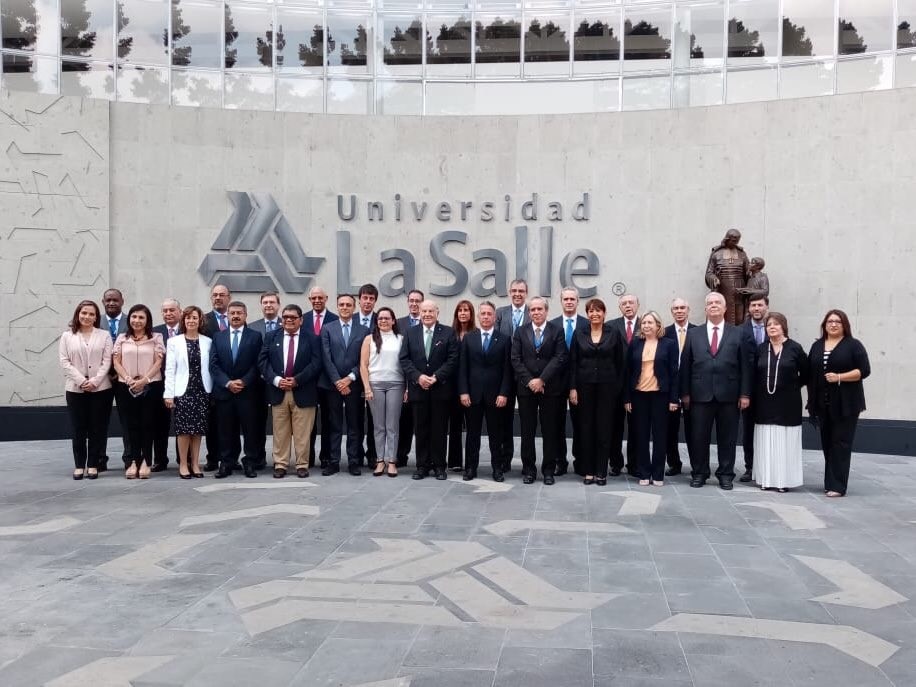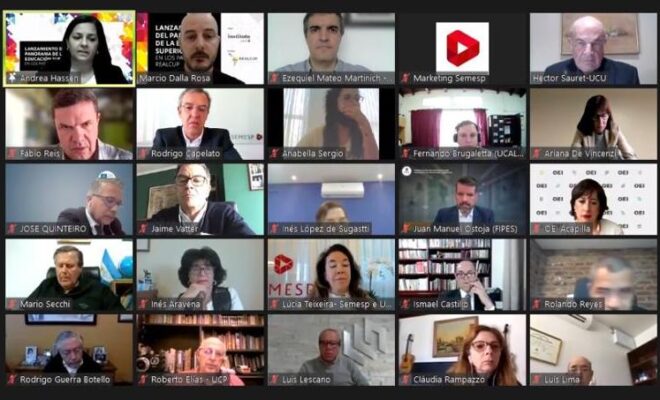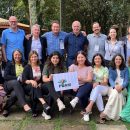Mobility and recognition on the agenda of the VIII Meeting of REALCUP


The VIII annual meeting of the Red de Asociaciones Latinoamericanas y Caribeñas de Universidades Privadas REALCUP (Network of Latin American and Caribbean Associations of Private Universities) took place at the headquarters of the Universidad La Salle University of Mexico, on September 2 and 3, 2019, attended by representatives of organizations that group private institutions of higher education in 12 countries of the Region.
The opening ceremony was in charge of the general director of the Tecnológico Nacional de Mexico, Enrique Fernández, on behalf of the undersecretary of higher education of Mexico, Francisco Luciano Concheiro Bórquez. The president of the Federación de Instituciones Mexicanas Particulares de Educación Superior- FIMPES (Federation of Mexican Institutions of Higher Education), Emilio José Baños Ardavin; the president of REALCUP, Héctor Sauret and, the rector of the Universidad La Salle, Enrique González Álvarez, were also present.
Fernández mentioned the efforts made by the Mexican government in face of the challenge of reaching 50% coverage of the enrollment rate for students in higher education (currently 38%) by 2024, within the framework of the new provisions of the educational reform that Mexico is developing, and that are circumscribed within the framework of several campaign promises made by the constitutional President, Andrés Manuel López Obrador. In this regard, Fernández emphasized the importance that private higher education institutions (HE) have in complementing this effort. He added that this governmental project will require an investment of 6,000 billion pesos per year (US $ 300 million), while the elimination of registration and tuition fees in Mexican public education institutions will entail a state expenditure for the order of 11,000 million pesos (550 million US $).
Afterwards, the representatives of the affiliated associations submitted their respective reports. Subsequently, Rodolfo Néstor De Vincenzi, president of the Consejo de Rectores de la Universidades Privadas Argentinas-CRUP (Council of Rectors of Argentine Private Universities), said that 23% of Argentine universities are private and 77% are state-owned. However, the numbers of graduates are 34% and 66%, respectively. For his part, Luis Lescano Sáenz, in his capacity as general manager of the Federación de Instituciones Privadas de Educación Superior del Perú- FIPES (Federation of Private Institutions of Higher Education of Peru), in tune with the figures that show the growing importance of the private sector in the HE systems of the Region, added that 33% of Peruvian students are enrolled in the private sector.
The Asociación de Universidades la República Dominicana-ARDUE (Association of Universities of the Dominican Republic), in the voice of its president, José Ramón Holguín Brito, said that 53% of HE in the Dominican Republic is of a private nature and that this sector constitutes the fourth largest employer in the country. During the meeting, the president of REALCUP presented ARDUE with the certificate of full membership.
In general, the information presented by the associations affiliated with REALCUP show activities and contributions that enrich HE from the private sector. This is the case of the Asociación de Universidades Privadas de Panamá –AUPPA (Association of Private Universities of Panama) that assembles fifteen (15) affiliated institutions and which, on its own initiative, created a research institute in order to complement and enrich the national statistics that are compiled in education, in an effort to have a greater understanding of its impact on Panamanian higher education as a whole.

Regional student mobility in context
During the second block of the first day, the UNESCO International Institute for Higher Education in Latin America and the Caribbean (IESALC) presented information regarding the challenges and opportunities of recognition of studies and degrees in Latin America and the Caribbean. José Antonio Quinteiro, program coordinator of the Institute, analyzed HE mobility data in the region based on figures from the UNESCO Institute for Statistics.
In the IESALC study, Recognition of Studies, Degrees and Diplomas in Latin America and the Caribbean (LAC): challenges and opportunities, the region shows a slower growth in mobility compared to the increase in internationally mobilized HE students: while at a global level it went from 2.05% to 2.3%, in LAC it registered a growth from 1.09% to 1.14% in 2017. Additionally, “of the 5 million internationally mobilized students only 176 thousand, 3.5% of the total, choose a country in Latin America as their destination”, he said.
For the IESALC, the global growth of mobilized students would bring an increase in enrollment and mobility costs, which could become an opportunity for the region, with countries such as Mexico and Brazil that have robust educational systems and large installed capacities which could accommodate a greater number of students from Latin America and the Caribbean.
In this context, UNESCO promotes initiatives that favor the mobility of students, teachers and researchers in the Region, such as the recently adopted Convention on the Recognition of Studies, Degrees and Diplomas in Higher Education in LAC, with an impact on regional cooperation and integration, and its implementation will contribute to safeguarding the right to education, inclusion and the pursuit of the Sustainable Development Goal 4 agenda.
In November 2019, within the framework of the UNESCO General Conference, the draft Global Recognition Convention will be presented for its adoption; once approved, it will become the only international normative instrument on recognition with global scope with the main goal of strengthening the rights of international students, and therefore, favor global mobility.
RELATED ITEMS








